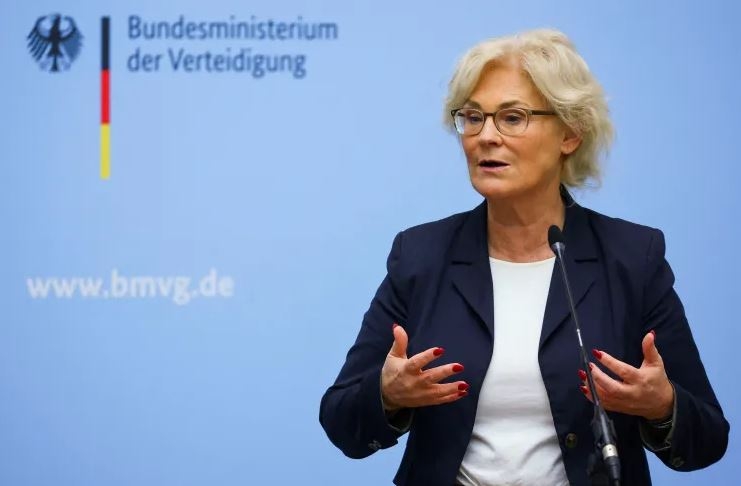Christine Lambrecht, the Defense Minister of Germany, has resigned after a year of facing harsh criticism for numerous public gaffes, her reaction to the conflict in Ukraine, and the poor completion of a planned military expansion. These issues all contributed to her decision to quit.
Ms. Lambrecht is the highest-ranking member of Chancellor Olaf Scholz’s cabinet to leave up to this point, and it is probable that her departure would be perceived as a blow to both him and his party, the Social Democrats, who are the senior members of his three-way government coalition.
Ms. Lambrecht was a member of the Social Democratic Party and a former minister of justice. In a recent interview with the newspaper Süddeutsche Zeitung, Mr. Scholz referred to Ms. Lambrecht as a “first-rate defence minister,” despite the fact that he had previously defended her on multiple occasions.
Ms. Lambrecht has been the target of persistent criticism ever since she assumed her position in the administration under Mr. Scholz a year ago. The most prominent opposition party, the conservative Christian Democrats, have made her their primary point of focus in their assaults on the government.
She had no prior experience in the military, and her peers in politics and security specialists generally believed that she lacked interest in leading the defence ministry due to her lack of previous expertise. During an interview with Bild, the German newspaper that has the highest circulation in the country, Ms. Lambrecht reportedly was unable to identify the ranks that are used in the German military.
The resignation comes at a difficult time for Mr. Scholz, whose government is facing increasing pressure to send Ukraine its heavy Leopard 2 tanks or to give permission to other European nations to send their own Leopard tanks. The resignation came at a time when Mr. Scholz’s government was facing difficult circumstances. Before delivering any weapons manufactured in Germany, the recipient nations are obligated to first get authorisation from Berlin. However, it is not anticipated that her retirement would result in a change in Germany’s reluctance to deploy tanks up to this point. That choice has always been seen as resting with the chancellery.
Mr. Scholz may face further difficulty if he is unable to find a suitable replacement. It is often very difficult to fill positions in Germany’s Ministry of Defense. This is especially true within the ranks of the Social Democrats, a party that is still struggling internally to abandon a pacifist foreign policy stance in the wake of Russia’s invasion of Ukraine. The position of Minister of Defense is one of the most important in Germany. One other option he has is to rearrange the cabinet’s positions.
Since the outbreak of hostilities in Ukraine, Ms. Lambrecht has been subjected to an increasing amount of public ridicule. Ms. Lambrecht was trumpeting the delivery of 5,000 helmets at the time when European governments were debating whether or not to provide weaponry to Kyiv during the early days of the invasion. Despite the fact that she was only following out a programme that was mostly pushed by Mr. Scholz, she was the public face of the government’s repeated delay tactics in regard to the shipment of weapons.
Ulrike Franke, a German military specialist at the European Council on Foreign Relations, said that “she wasn’t the ideal person for the position at such a vital time,” when everyone was looking toward Europe’s largest power to do more. Franke’s comments were made in reference to Angela Merkel.
The revelation that Ms. Lambrecht had used a government helicopter to take her son on a family vacation over the previous summer brought about a significant increase in the level of criticism levelled against her.
More recently, opposition parties in Germany have argued that Ms. Lambrecht is to blame for the slow rollout of a defence fund worth 100 billion euros, which is approximately $108 billion. This fund is a component of a plan by the government to significantly strengthen its military in response to the conflict in Ukraine. Only a few hours or days’ worth of fighting could be sustained with Germany’s meagre supply of basic munitions.
Ms. Franke stated that despite the fact that the outgoing defence minister was frequently criticised for decisions that were actually led by the chancellery, Ms. Lambrecht’s primary failing was her inability or reluctance to take up the project of a “Zeitenwende,” or turning point, in Germany’s foreign and military policy.
After Russia invaded Ukraine, one of Mr. Scholz’s primary goals was to make the German armed forces ready for an age of increasing instability throughout Europe. This came as a direct result of Russia’s invasion of Ukraine.
An embarrassing video that was posted on Ms. Lambrecht’s personal Instagram account on New Year’s Eve seems to have been the last straw that caused the situation to escalate. In it, Ms. Lambrecht spoke about the situation in Ukraine and wished everyone a happy holiday against the boisterous background of fireworks in Berlin. The film was deemed insensitive by its detractors, and even her own ministry distanced itself from it, claiming that it was a personal statement on her part.
In her message, Ms. Lambrecht expressed the hope that her resignation would return the attention of the public to where it should have been all along. “The important job that the troops are doing and the numerous others who are inspired in the area of operations must be brought to the forefront,” she added.

